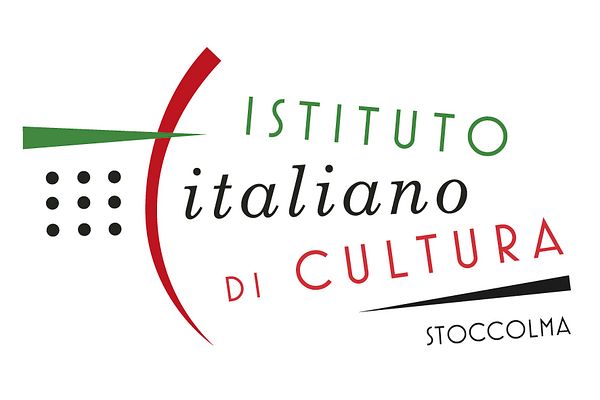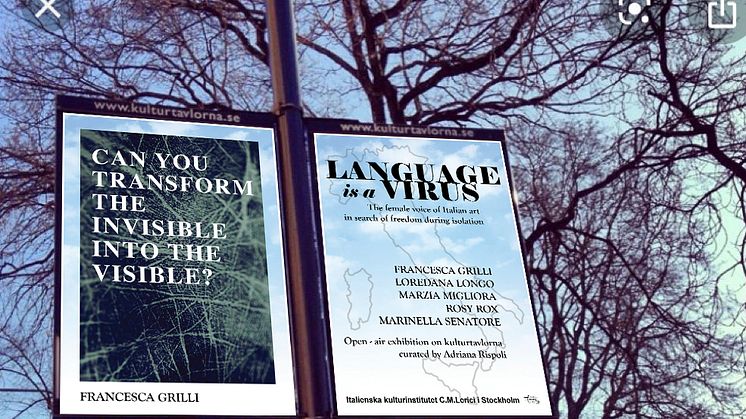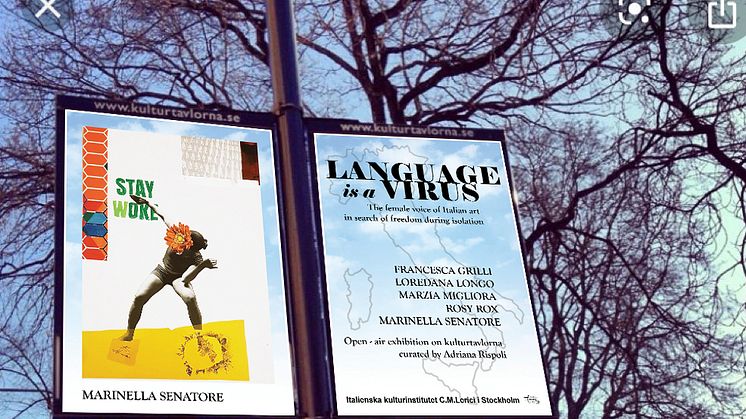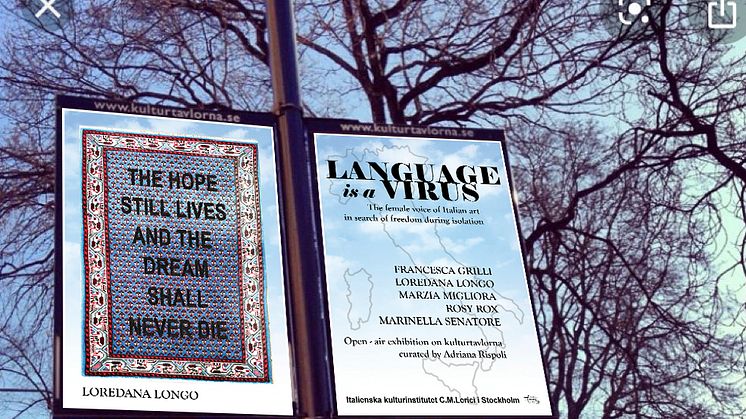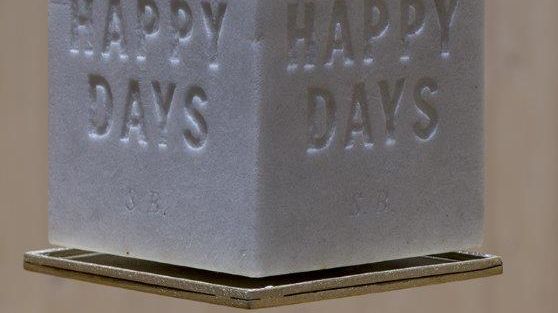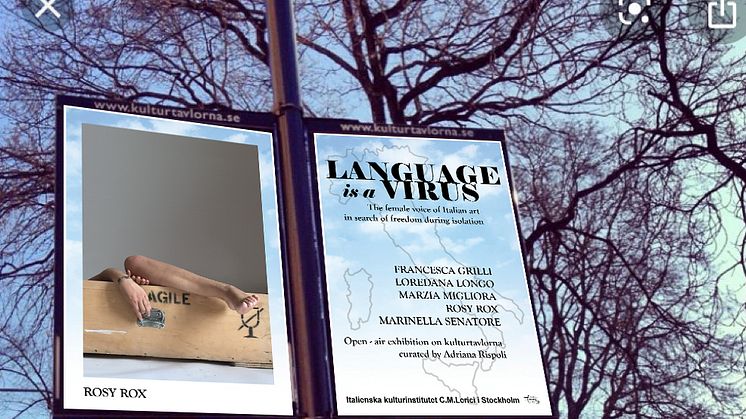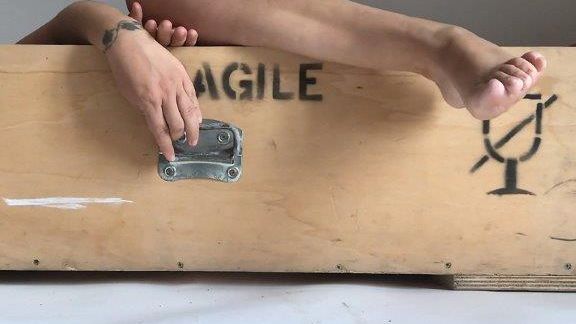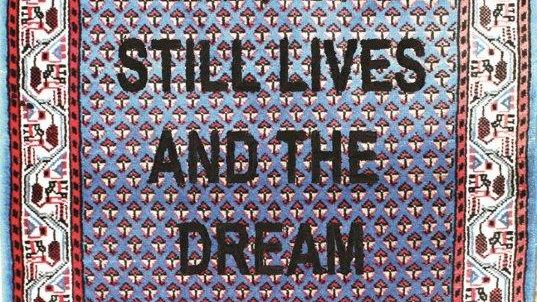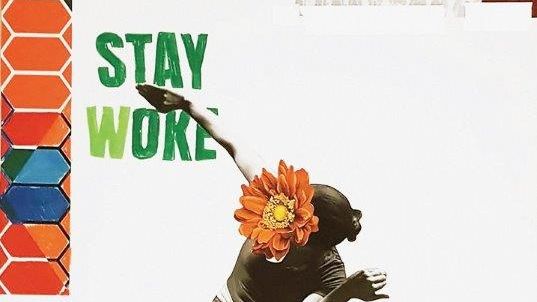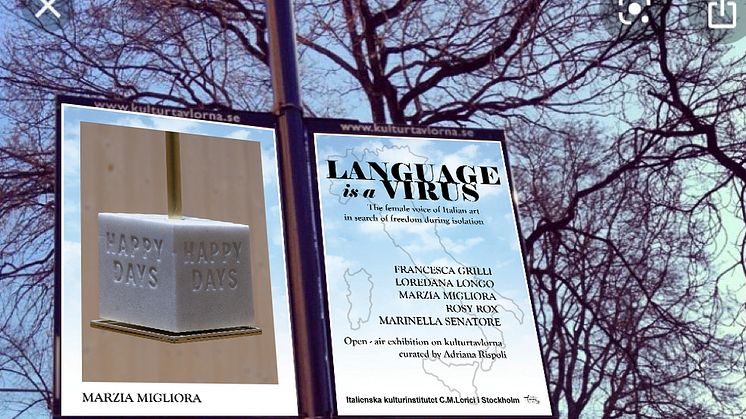
Pressmeddelande -
LANGUAGE IS A VIRUS The female voice of Italian art in search of freedom during isolation
LANGUAGE IS A VIRUS is an open-air exhibition curated by Adriana Rispoli for the Italian Cultural Institute in Stockholm during the Covid19 emergency. As a response to the suspension of all the activities, art pursues its continuous dialogue with life by experimenting new expressive formats.
Italian Cultural Institute's director Maria Sica states: "We aim to convey an open communication with the Stockholm’s citizens and also to reach out to a new audience, in order to renew a dialogue between art and urban spaces. It is important to demonstrate that in this moment art is not an elite medium. Maybe this crisis can show us new patterns to reinvent the traditional dynamics of the relationship between art and public. However, we find this exercise very stimulating since it involves a city where art has been nourishing the public space for a long time".
LANGUAGE IS A VIRUS uses advertising posters as technique and Stockholm’s streets as exhibition space. Although Sweden decided not to adopt restrictions as in Italy, cultural places such as museums, galleries and theaters have been closed to the public. In this moment of forced isolation, the city offers a space for communication to five Italian female artists: Francesca Grilli, Loredana Longo, Marzia Migliora, Rosy Rox and Marinella Senatore.
LANGUAGE IS A VIRUS is named after a performance-track song from 1986 by Laurie Anderson, who quoted William Burroughs's words: "the most dangerous virus was language". The Institute’s "exhibition" wants to point out both the liberating power of the verbal and visual language and its subversive ability to appropriate the poster as an artistic medium. The exhibition gets out of the "white cube", the elitist space assigned to art, which is the museum, and it reaches the public area. The purpose is to keep alive the necessary relationship between art and viewers and to stimulate a critical reflection on the difficult moment we are experiencing.
From May 25th to June 14th, kulturtavlorna – Swedish capital city billboards – becomes the exhibition supports, used by the artists to communicate their messages linked to their personal researches.
Francesca Grilli elaborates the results of her performance Sparks, carried out with a group of girls in Tallin during the Saal Biennaal. She investigated the reversal of the relationship between childhood and adulthood through the learning of palmistry. Can you transform the invisible into the visible? is an extremely pertinent questions asked by the young participants during the preparation of the performance and it is shown by a handprint, the symbolic surface for the future’s interpretation.
The Hope still Lives and the Dream shall never die is the quote chosen by Loredana Longo, who in the prolific Carpet project builds a bridge between East and West by embroidering populist phrases commonly pronounced by Western leaders on traditional oriental rugs. The carpet is the symbol of a domestic dimension and here it becomes the support for populist quotes that belong to a collective sphere. Here, the artist appropriates the power that language exerts on the crowd by quoting Ted Kennedy's words Hope and Dream, which do not differ much from the ones used by politicians today.
Happy Days S.B. by Marzia Migliora is part of her large installation Lo spettro di Malthus, la gabbia, that is currently exhibited at the Serlachius Museums in Mänttä, Finland. The phrase Happy Days S.B. is a quote from Samuel Beckett's play. The artist engraved it on the four sides of a salt’s block, that is commonly used as a food supplement in horse breeding. Horses consume the block by licking it, until it completely disappears. The work refers to an illusory and fleeting vision of happiness and wealth: in the past, salt was the first exchange and trade object among peoples. Happy Days can sarcastically be referred to these days of fear and confinement in Italy.
The performer Rosy Rox resorts to body language and its symbolic value by proposing one of her quarantined exercises. AGILE becomes the protest of an artist who normally bases her work on the relationship with the audience. In the solitude of her home, she finds an ironic outburst in the semantic game of the box and the word aiming to testify the woman’s and artist’s condition: FRAGILE.
Stay Woke by Marinella Senatore is a work from the collages’ series Can one led a good life in a bad life, made with materials collected during the participatory works of The School of Narrative Dance. She brings together images of movement and words that have been shared during the workshops. Stay Woke wants to encourage to resistance: the silhouette of a "fighting" dancer with her solid roots in the nature stands out against a white background full of allegorical visual elements, such as the beehive and the flower that covers her face.
Relaterade länkar
Ämnen
Kategorier
Regioner
The Italian Cultural Institute in Stockholm is the official Italian governmental body dedicated to promoting Italian language and culture in Sweden. For this reason, the Institute conducts a number of different activities. It organises concerts, screenings, lectures, exhibitions and other cultural events, that with very few exceptions are free and open to the public. It facilitates initiatives that promote the Italian Language in Sweden, such as the coordination of Italian courses with Folkuniversitetet. The Institute collaborates with a number of institutes, universities, museums, academies, conservatories, galleries and publishers, as well as with press, radio and TV both in Sweden and in Italy. It provides documentation and information about Italian cultural life and the institutions working in this field.
